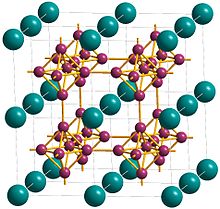Praseodymium hexaboride

 | |
| Names | |
|---|---|
| Other names Praseodymium boride | |
| Identifiers | |
3D model (JSmol) | |
| ChemSpider | |
| ECHA InfoCard | 100.031.382 |
| EC Number |
|
PubChem CID | |
CompTox Dashboard (EPA) | |
| |
| |
| Properties | |
| PrB6 | |
| Molar mass | 205.77 g/mol |
| Appearance | black crystals |
| Density | 4.84 g/cm3 |
| Melting point | 2610 °C[1] |
| Structure | |
| Cubic | |
| Pm3m ; Oh | |
Except where otherwise noted, data are given for materials in their standard state (at 25 °C [77 °F], 100 kPa). | |
Praseodymium hexaboride is a binary inorganic compound of praseodymium and boron with the formula PrB6. It forms black crystals that are insoluble in water.
Preparation
[edit]Praseodymium hexaboride can be prepared from the reaction of stoichiometric quantities of praseodymium and boron:
- Pr + 6B → PrB6
Properties
[edit]Praseodymium hexaboride forms black crystals of the cubic crystal system, with space group Pm3m, cell parameters a = 0.4129 nm, Z = 1, and structure isotypical with calcium hexaboride.[2] The compound melts congruently at 2610 °C.[3] At temperatures below 7 K, a magnetic transition to an antiferromagnetic state occurs in the compound.[4][5][6] It does not dissolve in water.
Uses
[edit]Praseodymium hexaboride is used as a component of alloys for cathodes of high-power electronic devices.
References
[edit]- ^ Справочник химика. Vol. 2 (3-е изд., испр ed.). Л.: Химия. 1971.
{{cite book}}: Unknown parameter|agency=ignored (help) - ^ Справочник химика. Vol. 1 (2-е изд., испр ed.). М.-Л.: Химия. 1966.
{{cite book}}: Unknown parameter|agency=ignored (help) - ^ Руководство по неорганическому синтезу: В 6-ти т. Vol. 4. М.: Мир. 1985.
{{cite book}}: Unknown parameter|agency=ignored (help) - ^ М.А. Анисимов, А.В. Кузнецов, А.В. Богач, В.В. Глушков, С.В. Демишев, Н.А. Самарин, Н.Ю. Шицевалова, А.В. Левченко, В.Б. Филипов, Н.Е. Случанко (2012). "Подавление спонтанной намагниченности в парамагнитной фазе PrB6" (PDF) (Материалы Международной научно-технической конференции ed.): 160–163. Archived from the original (PDF) on 2015-04-12.
{{cite journal}}: Cite journal requires|journal=(help)CS1 maint: date and year (link) CS1 maint: multiple names: authors list (link) - ^ H. Hacker Jr., Y. Shimada, K. S. Chung (1971). "Magnetic properties of CeB6, PrB6, EuB6, and GdB6". 4 (2) (Physica Status Solidi (a) ed.): 459–465. doi:10.1002/pssa.2210040221.
{{cite journal}}: Cite journal requires|journal=(help)CS1 maint: date and year (link) CS1 maint: multiple names: authors list (link) - ^ М.А. Анисимов, А.В. Богач, В.В. Глушков, С.В. Демишев, Н.А. Самарин, В.Б. Филипов, Н.Ю. Шицевалова, Н.Е. Случанко (2010). "Новая магнитная фаза в гексабориде празеодима" (PDF). 2 (1) (Труды МФТИ. — . — Том , № (5) ed.): 9–12. Archived from the original (PDF) on 2014-07-19.
{{cite journal}}: Cite journal requires|journal=(help)CS1 maint: date and year (link) CS1 maint: multiple names: authors list (link)